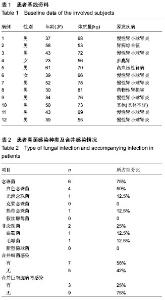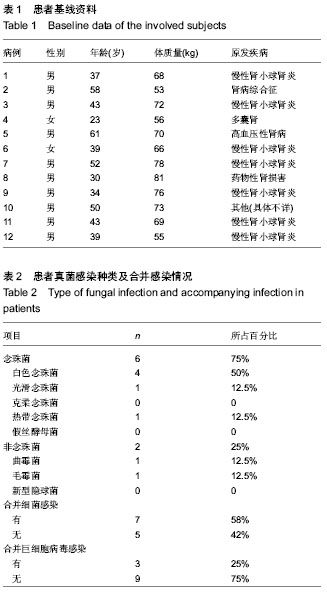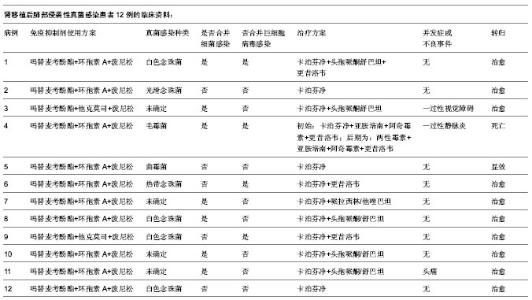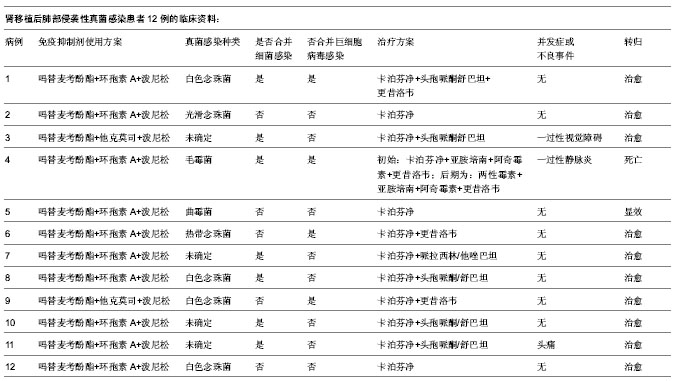| [1] Veroux M, Corona D, Gagliano M, et al. Voriconazole in the Treatment of Invasive Aspergillosis in Kidney Transplant Recipients. Transplant Proc. 2007;39(6):1838-1840.
[2] Pappas PG, Rex JH, Lee J, et al. A prospective observational study of candidemia: epidemiology, therapy, and influences on mortality in hospitalized adult and pediatric patients. Clin Infect Dis. 2003; 37(5): 634-643.
[3] Pema´n J, Canto´n E, Gobernado M. Epidemiology and antifungal susceptibility of Candida species isolated from blood: results of a 2-year multicentre study in Spain. Eur J Clin Microbiol Infect Dis. 2005; 24(1): 23-30.
[4] Harari S. Current strategies in the treatment of invasive Aspergillus infections in immunocompromised patients. Drugs. 1999; 58(4): 621-631.
[5] Ju MK, Joo DJ, Kim SJ, et al. Invasive Pulmonary Aspergillosis After Solid Organ Transplantation: Diagnosis and Treatment Based on 28 Years of Transplantation Experience. Transplant Proc. 2009; 41(1): 375-378.
[6] Herbrecht R, Denning DW, Patterson TF, et al. Voriconazole versus amphotericin B for primary therapy of invasive aspergillosis. N Engl J Med. 2002; 347(6):408-415.
[7] Fortún J, Martín-Dávila P, Sánchez MA, et al. Voriconazole in the treatment of invasive mold infection in transplant recipients. Eur J Clin Microbiol Infect Dis. 2003; 22(7): 408-415.
[8] Hashino S, Morita L, Takahata M, et al. Administration of micafungin as prophylactic antifungal therapy in patients undergoing allogeneic stem cell transplantation. Int J Hematol. 2008;87(1): 91-97.
[9] Hennen CR. Pharmacoeconomic evaluations of antifungal therapies. Curr Med Res Opin. 2009;25:1751-1758.
[10] 中华内科杂志编辑委员会.侵袭性肺部真菌感染的诊断标准与治疗原则(草案)[J].中华内科杂志,2006,45(8):697-700.
[11] Singh N, Husain S. Invasive aspergillosis in solid organ transplant recipients. Am J Transplant. 2009; 9(suppl 4): S180.
[12] Hassan I, Powell G, sidhu M, et al. Excess mortality, length of stay and cost attributable to candidaemia. J Infect . 2009; 59: 360-365.
[13] Walsh TJ, Teppler H, Donowitz GR, et al. Caspofungin versus lipo-somal amphotericin B for empirical antifungal therapy in patients with persistent fever and neutropenia. N Engl J Med. 2004;351(9):1391-1402.
[14] Wisplinghoff H, Bischoff T, Tallent SM, et al. Nosocomi-al bloodstream infections in US hospitals: analysis of 24,179 cases from a prospective nationwide surveillance study. Clin Infect Dis. 2004;39(3):309.
[15] Deresinski SC, Stevens DA. Caspofungin.Clin Infect Dis. 2003; 36(11):1445.
[16] Cuenca-Estrella M, Gomez-Lopez A, Mellado E,et al.Head to head comparisons of the activities of currently available antifungal agents against 3,378Spanish clinical isolates of yeasts andfilamentous fungi. Antimicrob Agent Chemother. 2006; 50:917-921.
[17] Patel R, Portela D, Badley AD, et al. Risk factors of invasive Candida and non-Candidafungal infections after liver transplantation.Transplantation. 1996; 62(7): 926-934.
[18] Miller LW, Naftel DC, Bourge RC, et al. Infection after hearttransplantation a multiinstitutional study. J Heart Lung Transplant. 1994; 13(3): 381-393.
[19] Gabardi S, Kubiak DW, Chandraker AK, et al. Invasive fungal infections and antifungal therapies in solid organ transplant recipients. Transpl Int. 2007; 20(12): 993-1015.
[20] Pugliese F, Ruberto F, Cappannoli A, et al. Incidence of fungal infections in a solid organ recipients dedicated intensive care unit. Transplant Proc. 2007; 39(6):2005-2007.
[21] Silveira FP, Husain S. Fungal infections in solid organ transplantation. Med Mycol. 2007; 45(4):305-320.
[22] Klontz KC, Lieb S, Schreiber M, et al. Syndromes ofVibrio vulnificusinfections. Clinical and epidemiologic features in Florida cases, 1981-1987. Ann Intern Med. 1988; 109: 318-323.
[23] Zaoutis TE, Argon J, Chu J, et al. The epidemiology and attributable outcomes of candidemia in adults and children hospitalized in the united states: a propensity analysis. Clin Inf Dis. 2005;41:1232-1239.
[24] Walsh TJ, Anaissie EJ, Denning DW, et al. Treatment of Aspergillosis: Clinical Practice Guidelines of the Infectious Diseases Society of America. Clin Infect Dis. 2008;46: 327-360.
[25] 蔡柏蔷,肖毅.当代呼吸病学进展[M]. 北京:中国协和医科大学出版社,2007:670-690.
[26] Humar A, Michaels M, AST ID Working Group in Infectious Disease Monitoring. American Society of Transplantation recommendations for screening, monitoring, and reporting of infectious complications in immunosuppression trials in recipients of organ transplantation. Am J Transplant. 2006; 6:262-274.
[27] Maertens J, Raad I, Petrikkos G,et al. Efficacy and safety of caspofungin for treatment of invasive aspergillosis in patients refractory to or intolerant of conventional antifungal therapy. Clin Inf DIs. 2004; 39:1563-1571. |



